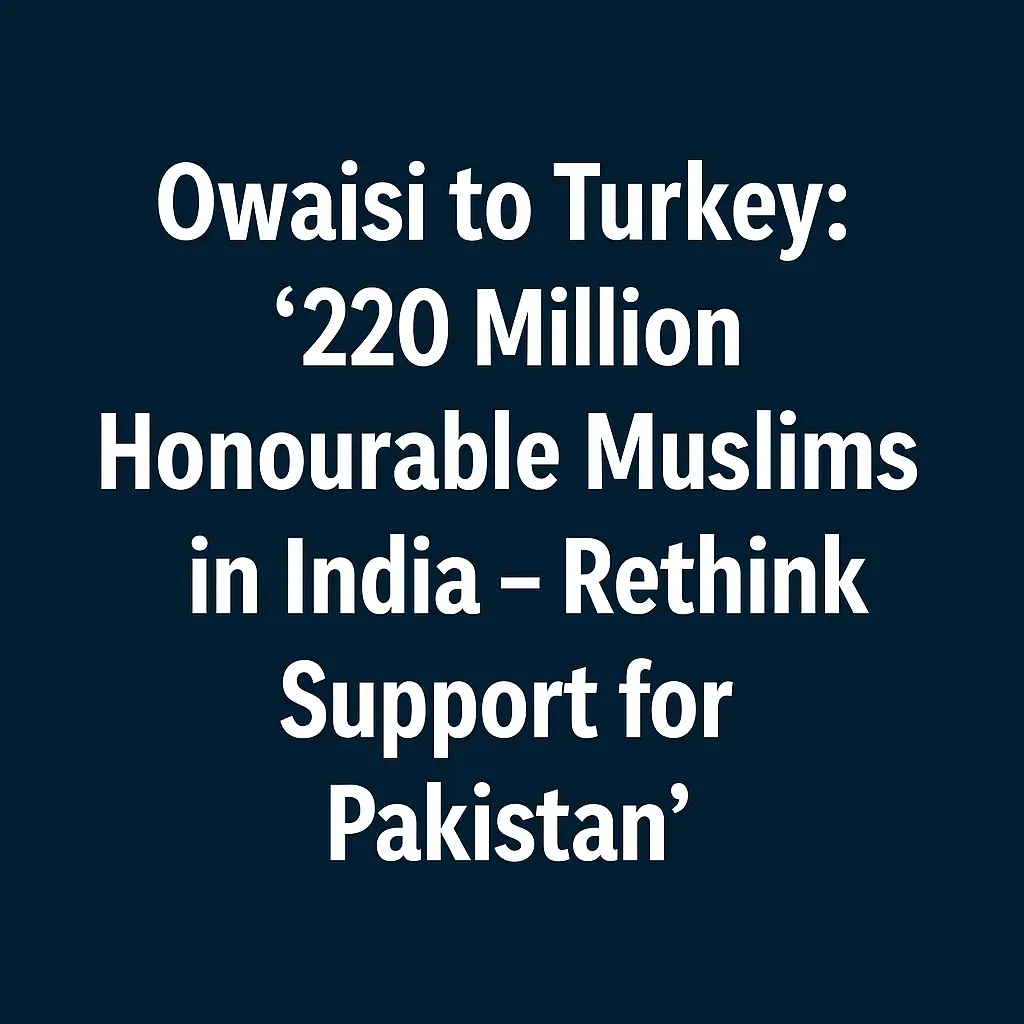Introduction
In a recent and significant political statement, Asaduddin Owaisi, the leader of the All India Majlis-e-Ittehadul Muslimeen (AIMIM), issued a clear warning to Turkey regarding its stance on Pakistan. Owaisi urged Turkey to reconsider its unconditional support for Pakistan and instead recognize the deep, historical, and socio-cultural ties that India shares with the Muslim community, which numbers around 220 million — making it one of the largest Muslim populations in the world. This statement comes amid growing geopolitical tensions in South Asia and reflects the complex relationship between India, Pakistan, and Turkey.
Background: India, Pakistan, and Turkey Relations
Turkey and Pakistan have historically shared strong diplomatic, military, and cultural ties, often positioning themselves as close allies in the Muslim world. However, India’s role as a regional power with a vast Muslim population has frequently been overlooked in these dynamics. Turkey’s support for Pakistan on various international forums, especially on Kashmir-related issues, has often been criticized by Indian political leaders and analysts alike.
Asaduddin Owaisi’s remarks challenge Turkey to reconsider these alliances by emphasizing India’s significant Muslim demographic, which plays a vital role in the country’s social fabric and democratic framework.
Owaisi’s Message: Highlighting India’s Muslim Community
Owaisi stressed that the 220 million Muslims in India are “honourable” citizens who contribute to the nation’s growth and diversity. He urged Turkey not to view the India-Pakistan rivalry through a simplistic lens but to appreciate the complexity and nuance of India’s multicultural democracy.
Key points from Owaisi’s message include:
- Recognition of India’s Muslim Population: India houses the third-largest Muslim population globally, second only to Indonesia and Pakistan. These Muslims are integral to India’s cultural, political, and economic spheres.
- Condemnation of Blind Support for Pakistan: Owaisi warned Turkey against blindly backing Pakistan without acknowledging India’s internal dynamics and the loyalty of its Muslim citizens.
- Call for Historical Understanding: He urged Turkey to acknowledge the long-standing ties and shared history between India and its Muslim population, which spans centuries beyond modern political conflicts.
The Importance of India’s Muslim Population
India’s 220 million Muslims represent approximately 14% of the country’s total population, making them a significant demographic. This population includes diverse ethnicities, languages, and traditions, united within India’s secular framework. Unlike Pakistan, where Islam is the state religion, India is constitutionally a secular state where religious minorities, including Muslims, have fundamental rights protected by law.
Owaisi’s statement underscores how India’s Muslims are embedded in the nation’s democratic process, contributing as voters, politicians, businesspeople, scholars, and citizens. This demographic plays a crucial role in shaping India’s social and political landscape.
Why Turkey’s Support for Pakistan is Contentious
Turkey’s alliance with Pakistan is partly driven by shared Islamic identity and geopolitical interests, especially in contesting India’s influence in the Muslim world. Turkey has repeatedly voiced support for Pakistan’s position on Kashmir, a disputed territory between India and Pakistan that has led to multiple wars and ongoing conflict.
However, India’s leadership, including voices like Owaisi’s, argues that Turkey’s unwavering support for Pakistan overlooks:
- The pluralistic and democratic nature of India’s Muslim community.
- The complex history and relationships within the Indian subcontinent.
- The economic and social progress of Muslims within India’s democratic framework.
Owaisi’s Call to Turkey: A Diplomatic Appeal
Owaisi’s appeal to Turkey is not merely political rhetoric; it’s a diplomatic call for a nuanced understanding of South Asia’s complex realities. By urging Turkey to rethink its support, Owaisi suggests:
- Engaging with India directly on issues concerning Muslims.
- Recognizing the diversity within the Muslim world rather than adopting monolithic views.
- Encouraging Turkey to strengthen its relations with India, which can have positive implications for regional stability and economic cooperation.
The Historical Ties Between India and Turkey
India and Turkey share centuries of history that includes trade, cultural exchanges, and diplomatic contacts. The Mughal Empire, which ruled much of India for several centuries, was founded by Central Asian rulers who had close cultural and familial ties to the Turkish region.
Moreover, India and Turkey have a history of mutual respect despite modern political differences. Owaisi’s emphasis on these historical links serves to remind Turkey that India’s Muslims are part of a shared heritage and deserve recognition beyond current geopolitical disputes.
The Role of India’s Muslims in the Nation’s Progress
India’s Muslims contribute significantly to various sectors including:
- Politics: Several prominent Muslim leaders hold key political positions across parties.
- Economy: Muslim entrepreneurs and business communities are thriving in various regions.
- Culture: India’s rich Muslim heritage is reflected in its architecture, literature, cuisine, and festivals.
- Education: Muslim educational institutions contribute to academic excellence.
Owaisi highlights that these contributions should be acknowledged by international actors like Turkey rather than overshadowed by political alliances.
How Turkey Can Benefit by Rethinking Its Position
By recognizing India’s vast Muslim population and their contributions, Turkey stands to gain:
- Improved Diplomatic Relations: With India as a major global player, positive ties can foster trade, tourism, and cultural exchanges.
- Regional Stability: Supporting peaceful coexistence and cooperation rather than division could help ease South Asia’s long-standing conflicts.
- Broader Muslim Solidarity: Turkey can lead efforts to unify the diverse Muslim populations worldwide by embracing pluralism and inclusiveness.
Conclusion
Asaduddin Owaisi’s message to Turkey is a compelling call for a more balanced and informed approach to South Asian geopolitics. With 220 million honourable Muslims residing in India, Turkey’s continued, unconditional backing of Pakistan may miss the nuanced realities on the ground. Recognizing India’s Muslim community’s role and the deep historical ties shared between India and Turkey could pave the way for stronger bilateral relations, regional peace, and a more inclusive global Muslim identity.

